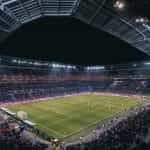French operators told to limit ads during FIFA World Cup
In an effort to cut down the number of gambling ads during the 2022 FIFA World Cup, French regulator l’Autorité Nationale des Jeux (ANJ) has signed four commitment charters with gambling operators and advertisers to reduce the frequency of ads this month. The charters aim to promote responsible commercial communications by moderating and regulating ads on television, radio, hoardings and digital platforms.

French regulators have told operators to reduce ad frequency as well as to avoid targeting vulnerable groups with their ads. ©Matthieu Joannon/Unsplash
France was one of the many nations that were hit by the gambling ads barrage during the 2020 UEFA European Football Championship in 2021. As a result, the ANJ had acted on it after a wide public consultation in February 2022. The objective was to abate the frequency of gambling ads across all platforms, including television, radio, hoardings and digital, and also protect vulnerable audiences and minors. Hence, commercial content guidelines were set, and advertising reduction recommendations were put forth. This two-step plan was brought into play to moderate promotional activities during the UEFA European Football Championship in 2021. Now, the four charters include two existing charters that have been revised and two completely new ones.
The existing charters are for television and radio. Post-revision, advertisers can only show three gambling ads during a break. Before the revision, they could show four. The third charter is a new one that concentrates on hoardings. Advertisers have received communication to not have gambling ad hoardings in the vicinity of addictology care centers and schools. In addition to that, the visual advertising at metro and train stations will have to be limited. The ANJ will replace current advertising with ads promoting responsible gambling and preventing excessive and risky gambling.
Focus on digital channels
The fourth and final charter focuses on advertising on digital platforms. The guidelines apply to all licensed operators in France as well as to all the members of the Digital Alliance. It comprises a guide that will help advertisers understand how to advertise on digital platforms like social media, websites, and mobile and web applications. It will also include guidelines on the utilization of ambassadors, celebrities and influencers. The operators are on the same page regarding the protection of minors and other vulnerable individuals from ads on digital platforms promoting gambling. As part of its annual monitoring, the ANJ will examine how these charters are being implemented, said president Isabelle Falque-Pierrotin.
“Following Euro 2020, the ANJ initiated an ambitious action plan to moderate the content of advertisements for gambling and the advertising pressure to which the public is exposed. A few days before the start of the World Cup, the signing of these charters in a spirit of co-regulation is a strong signal from all the players concerned to promote responsible advertising. The period ahead of us is crucial because it will allow everyone to verify that advertising in the gambling sector has changed and that the commitments made are respected.”
ANJ following in the footsteps of the KSA
As the FIFA World Cup draws closer, France is not the only nation being forced to act on rampant gambling ads. The topic has fallen under the spotlight in the Netherlands as well. In October this year, the supervisor and regulator of gambling services in the Netherlands – The Kansspelautoriteit (KSA) – issued a stern warning to all advertisers due to the prevalence of gambling ads.
Just like in France, advertisers were not asked to cease the ads and promotion. They only have to ensure that the frequency remains moderate. Similar to the ANJ’s four charters, the KSA had four points revolving around this subject. The KSA’s four directive were focused on:
- Disallowing ‘role models’, influencers, and former athletes from appearing in gambling ads.
- A specific focus on removing minors and other vulnerable groups from being targeted with ads.
- Stopping football prop betting from being offered on betting platforms.
- Sanctions on illegal gambling operators and offers.
KSA’s directives also came with a theme of protecting the reputation of the gambling industry, which it suggested had taken a beating following the legalization of gambling and the subsequent barrage of advertising. The chairman, Rene Jansen, said that it wasn’t too late to put a stop to this reality.
“I just hope the underlying message gets through to the gambling providers. That is: there is a limit to what society accepts. This was clearly exceeded by the sector after the opening of the legal online gambling market. The industry as a whole and individual gambling companies individually have not excelled in displaying well-considered behaviour. Earning money quickly and gaining additional market share should not be considered more important than carefully and jointly building a sector where consumers can enjoy recreational and controlled participation in games of chance in a safe environment. On the contrary! An old Dutch saying applies here: better to turn halfway than to be completely astray. A new tidal wave of advertising would mean an extra blow to the image of the sector and perhaps the prelude to even more far-reaching regulation of what is allowed in the field of advertising. I’d say don’t let it get to that point.”



